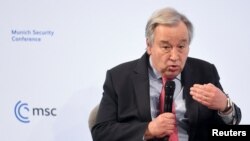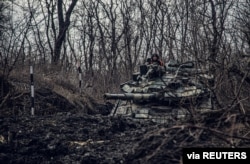U.N. Secretary-General Antonio Guterres said Friday of Russian troops surrounding Ukraine, that it is "high time to seriously de-escalate."
"I still think it will not happen," he told Western leaders gathered in Germany for the Munich Security Conference about a possible Russian invasion of its southwestern neighbor. "But if it did, it would be catastrophic."
Guterres has repeatedly called for de-escalation, diplomacy and dialogue, warning that the price of armed conflict in human suffering, destruction and damage to European and global security is too high to even contemplate.
He said that he is often asked if the world is experiencing a new Cold War.
"My answer is that the threat to global security now is more complex and probably higher than at that time," the U.N. chief said, referring to the period from the end of World War II until the Soviet Union's break up in 1991.
He noted that during the Cold War, there were mechanisms such as back channels to prevent crises.
"Today, many of those systems no longer exist and most of the people trained to use them are no longer here with us," he noted. "So, miscommunication and miscalculation can make a minor incident between powers escalate out of control, causing incalculable harm."
The United States and some Western allies say Moscow has amassed more than 150,000 troops on Ukraine's borders. Russia dismisses claims it is planning an imminent invasion as Western hysteria.
The U.N. chief reminded leaders of their commitments under the organization's charter to settle disputes by peaceful means and not to use force, or the threat of it, against another state.
"I urge all parties to be extremely careful with their rhetoric," he added. "Public statements should aim to reduce tensions, not inflame them."
Guterres added that geopolitical divides are rarely solved, but "they can and must be managed."
Humanitarian operations continue in eastern Ukraine and the United Nation's local and international staff and their dependents remain, despite the decision of several countries to evacuate their nationals.
The U.N. says there are 2.9 million people in need of humanitarian assistance and protection due to the eight-year-old conflict in the eastern regions of Donetsk and Luhansk. The organization has appealed for $190 million this year to reach 1.8 million of the most vulnerable people with assistance.





